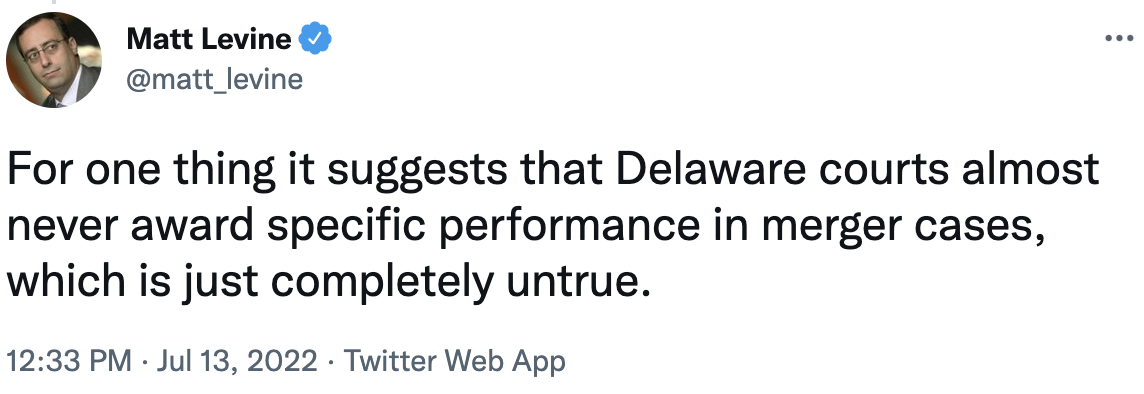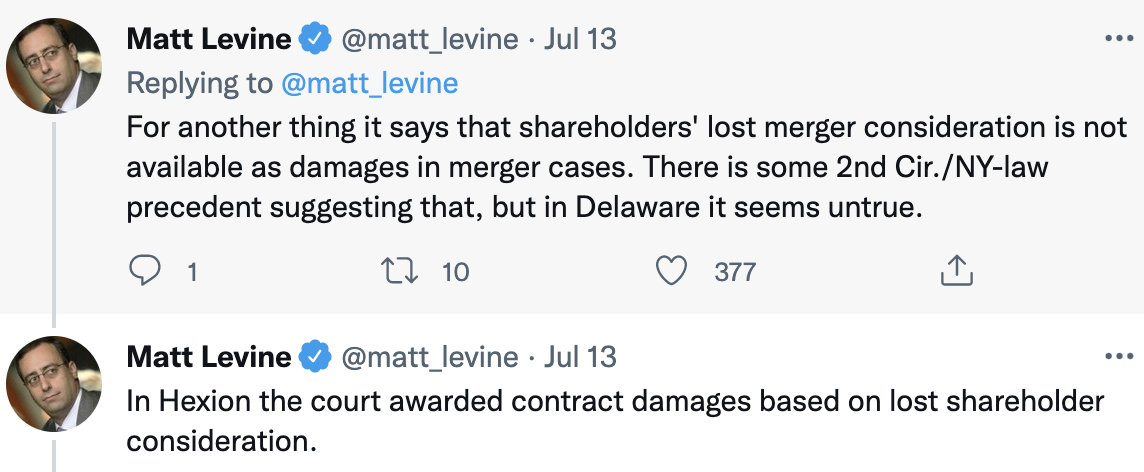Elon Musk Will Beat Twitter! WSJ Says It's Obvious... Assuming You Change Every Single Fact And Law.
Wall Street Journal stans hard for their boy Elon.
 [UPDATE: One of the authors responded and it’s… GLORIOUS! Appended at the bottom.]
[UPDATE: One of the authors responded and it’s… GLORIOUS! Appended at the bottom.]
The Wall Street Journal editorial page followed up its piece about how there was probably no 10-year-old rape victim who needed an abortion — an op-ed editorial fundamentally debunked within hours — by digging deep to find a couple of guys willing to offer the scorching hot take that Twitter will lose actually, thus capping off the wrongest week in the history of the wrongest op-ed editorial page. [UPDATE: I was playing fast and loose with the term op-ed. The former was an editorial.]
Nobody seriously thinks Twitter is in trouble here. Business professor Scott Galloway went so far as to call the merger agreement “hermetically sealed, it’s so airtight.” Musk’s very capable lawyers will spend the litigation on the defensive. They might “win” to the extent they force Twitter to walk away with less than Twitter wants, but that’s not this op-ed — this op-ed asserts that Musk wins outright.

The Ethical use of Generative AI

It’s like the lawyerly version of the worst hot take sports show.
Many observers think the company will prevail, or that Mr. Musk is likely at least to pay the $1 billion breakup fee.
They’re wrong. He is likely to walk away largely unscathed, a belief reflected in Twitter’s stock price. This case will be a good lesson on the limits of boilerplate merger agreements and the difference between a corporation and its shareholders.
Sponsored

Attention Buyer: Not All Legal AI Models Are Created Equal

The Ethical use of Generative AI


How To Maximize Productivity With Westlaw Precision With CoCounsel


Attention Buyer: Not All Legal AI Models Are Created Equal
This is still the first paragraph of this thing and it’s already a joke. This case tests “the limits of boilerplate merger agreements” the same way the Super Bowl tests the NL adopting the designated hitter — this wasn’t a boilerplate merger agreement. Twitter didn’t send over LegalZoom’s “Standard $43 Billion Merger Agreement” for Elon Musk to sign like the naive babe in the woods that only the richest man in the world could be. This is an agreement between two sophisticated entities, at arms length, represented by elite counsel AND elite banks who all hammered it out throughout the night. This is as bespoke as bespoke agreements get in this world. A fact we know because…
Specific performance is used fleetingly, and for good reason. It is the ultimate act of coercion, and it makes sense only when there is no alternative. If one agrees to sell Hearst Castle, but tries to back out when a higher bid emerges, a court may specifically enforce the contract. There is only one Hearst Castle, and no other remedy can make the jilted buyer whole.
See, another reason specific performance is “used fleetingly” is that while it’s always a remedy available to courts, it’s not generally something people contract for. The painter in this example said, “I’ll paint the castle” not “I’ll paint the castle and if I don’t I agree that I will not object when the court orders me to paint the castle.” That second one is the bit Musk agreed to. At a certain point, when a billionaire and Skadden and Morgan Stanley all agree to an unusually explicit provision, that’s on them. And, again, this is why we know it’s not “boilerplate.”
It’s also completely wrong about Delaware even if this provision wasn’t in the contract. For this, we look to Bloomberg’s Matt Levine:

Sponsored

Mitigating M&A Cyber Risk: Pre- & Post-Acquisition Due Diligence

New Report - Are Small Firms Achieving Their Legal Tech Goals?
Honestly, these cases are so simple to find. So these yahoos didn’t bother to perform even cursory research on Delaware law before spouting off?
Don’t worry… it’s going to be a trend in their article!
The authors also conjure up a convoluted theory how, assuming the court can’t order specific performance (it could), there’s no alternative remedy because making Musk pay the costs incurred by the merger he’s not performing won’t work because the shareholders aren’t a party to the lawsuit.
Twitter could have raised the stakes for Mr. Musk by including a requirement that he pay damages to its shareholders if he walked away. In that case, the shareholders could have sued for the difference between the amount Mr. Musk agreed to pay and the price any other suitor would pay—like the homeowner finding another painter. But the merger agreement doesn’t give shareholders this remedy.
Um… no:

You can read up on that Hexion case here but the crux of it is this:
Although the court did not order specific performance of Hexion’s obligation to actually consummate the merger, it required Hexion to specifically perform its covenants related to financing and antitrust compliance and ruled that, if Hexion should fail to close, Huntsman’s potential damages would not be limited to the break-up fee.
Screwing up the finer points of Delaware law is one thing, but then they swing for the fences and try to get Elon out of everything and… wow:
The issue of the $1 billion breakup fee remains. Courts will be much more likely to make Musk pay to walk away than force him to walk down the aisle. But it isn’t clear he will have to pay that much. Breakup fees are supposed to reflect damages caused by a breach of contract. They aren’t supposed to act as a penalty. Given that Twitter isn’t obviously worse off by $1 billion—if at all—a court might balk at imposing such a high fee.
No. No no no no no. Contract agreements like these aren’t “meant to reflect” jack. Musk said “I’ll give you $1B unless there’s a material adverse effect,” not “I’ll give you $1B (or some smaller number if we don’t really think it’s worth $1B).” Delaware does impose some constraints on breakup fees, but generally they’re accepted as negotiated unless they’re upwards of 5 percent or more of the total deal. Since this fee is about TWO percent of the total deal, it falls below the 3 to 4 percent window that Delaware routinely upholds.
So, to quickly recap, Musk will win if the agreement is boilerplate (it’s not), Delaware refuses to grant specific performance (it doesn’t), courts can’t issue monetary damages unless shareholders are a party (untrue), and the breakup fee is unreasonable under the law (it’s not).
Who did the Wall Street Journal even find to put this out here?
Mr. Heaton is managing member of an investment research firm. Mr. Henderson is a law professor at the University of Chicago. They are co-founders of Heaton Henderson LLC, a corporate governance consultancy.
Ah. J.B. Heaton is best known around these parts for a study where he tried to rank law schools by the quality of their overall team of scholars. It was really fun though didn’t say much about Delaware law expertise. Meanwhile, third-rate intellect Todd Henderson is just adding this string of nonsense to his existing legal hits like when he called Sonia Sotomayor dumb or whined about the sad marginalization of a student group calling immigrants “toilet people.”
One thing you’ve got to hand to Musk is that he’s swung conservative outlets like the Wall Street Journal behind a solar power and electric car mogul so hard that they’ll bend over backward to stan for him and all he had to do is say that he wants racists back on social media.
Unfortunately, that one savvy marketing move probably isn’t enough to get out of this contract.
[UPDATE: J.B. Heaton just emailed and it’s straight up high comedy.
Go find a friend who can do math and ask them to divide 37.54 by 54.20 and then go find someone who knows probability and ask them to explain to you what the answer means about the quality of our analysis versus yours. While doing so, ask Scott Galloway where he got his law degree and ask Matt Levine the last time he stepped into a courtroom.
Best wishes douche bag
Note, of course, that this math problem (0.6926 btw) is still completely irrelevant as a matter of law. But we need to use that… to find probability… and compare it to a business professor’s law degree or something? Or Matt Levine’s… courtroom experience? He’s a M&A lawyer and I-Banker so… he doesn’t go to courts? Look, I promise not to try to figure out what these doofuses are saying anymore.
But this is whole exchange is a pretty good breakdown of how serious they are. No citations to Delaware law or mention of the terms of the contract, just “DERP! MATH-ISH!
UPDATE 2: It gets better. After I told him this response was “hilarious” and thanked him he sent this:
Post away! I generally disagree with Todd about the pervasiveness of inferior intellects, but your – is it a blog post? – work is pushing me in his direction!
Twitter’s Lawsuit Against Elon Musk Looks Like a Loser [WSJ]
Earlier: Twitter Complaint Demonstrates That Every Lawyer, Everywhere, Always Is Smarter Than Elon Musk
Dumb Law School Professor Calls Supreme Court Justice Dumb
Crybaby Law Professor Quits Twitter In A Huff Over UChicago Immigration Slur Debacle
 Joe Patrice is a senior editor at Above the Law and co-host of Thinking Like A Lawyer. Feel free to email any tips, questions, or comments. Follow him on Twitter if you’re interested in law, politics, and a healthy dose of college sports news. Joe also serves as a Managing Director at RPN Executive Search.
Joe Patrice is a senior editor at Above the Law and co-host of Thinking Like A Lawyer. Feel free to email any tips, questions, or comments. Follow him on Twitter if you’re interested in law, politics, and a healthy dose of college sports news. Joe also serves as a Managing Director at RPN Executive Search.







